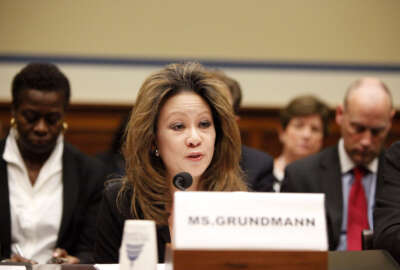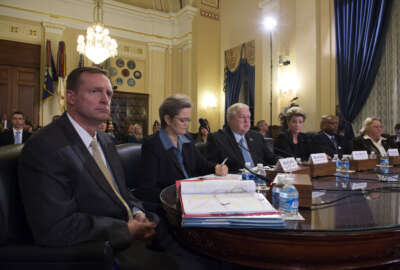
MSPB has never been without a quorum for this long
Mark Robbins, the lone member and chairman of the Merit Systems Protection Board, has personally voted on 750 petitions for review since the agency lost its second...
It’s been more than a year since the Merit Systems Protection Board, the independent, quasi-judicial agency that reviews civil service merit principles, had a quorum.
The agency hasn’t had enough members to take some official actions since Jan. 8, 2017.
It’s the longest the board has ever been without at least two voting members since the agency’s inception in 1979, said Bill Wiley, who served as a chief counsel for former MSPB chairmen and continues to follow the agency as a federal employment attorney and co-founder of the Federal Law Training Group. He recalled a time in the late 1980s when the board lacked a quorum for about six weeks, but other than a few short instances since, MSPB hasn’t been without permanent board leadership for so long, Wiley said.
Administrative judges within MSPB’s regional offices can and continue to issue initial decisions. The three-member board, however, cannot issue final decisions on petitions for review. The board historically receives about 1,200 of them a year.
MSPB spokesman Bill Spencer said the board currently had 765 cases pending before all members.
Mark Robbins, who President Donald Trump designated as MSPB chairman last January, continues to vote on the petitions that to his office. He’s personally weighed in on most of the 765 matters — about 750 of them — since the second board member and then-chairwoman, Susan Tsui Grundmann, left the agency in January.
“These cases are coming in at a regular rate, and I’m first up on all of them, Robbins said during a recent interview on the Federal Drive with Tom Temin. Robbins said he receives about 80 cases a month. Once he completes his research, writing and decision-making for each matter, they await a decision from at least one other Senate-confirmed board member.
But Trump hasn’t nominated anyone to join Robbins on the board. And Robbins’ term expires this March, though he could serve for an additional year in holdover capacity until March 1, 2019.
Still, federal employee attorneys say the current inaction is making them fearful for the agency’s future.
“I don’t think anyone who does what I do has any expectation that Trump is going to nominate anyone to fill one of those slots to give the board quorum,” said Debra D’Agostino, a federal employment attorney with the Federal Practice Group.
Wiley originally predicted the board would have at least one new member sometime over last summer.
“We can’t figure out why the White House is taking this long,” he said. “For the first few months, February, March, April, May, everyone wants to be [an] ambassador … and President Trump is doing all kinds of stuff. You can’t expect him to focus on these backwater agencies, like MSPB and the other oversight agencies.”
Indeed, the Trump administration has been slower than previous administrations to appoint nominees. Of 626 key positions that require Senate confirmation, 245 have no nominee, according to data compiled by the Partnership for Public Service and the Washington Post.
The Senate confirmation process has languished as well. As of Jan. 3, it’s taken Trump nominees an average of 72 days to receive their confirmation, compared to 54 days for Obama nominees and 36 days for George W. Bush nominees, according to the Partnership’s vacancy tracker.
But by the summer, Trump began making appointments to the Office of Special Counsel and Federal Labor Relations Authority. He replaced all seven members on the Federal Service Impasses Panel, who don’t need Senate confirmation.
“Through the summer, we started to say, ‘Hey, the White House really does know these oversight agencies are out here. Now … let’s see what they’re going to do with MSPB.’ Nothing. Either that’s a tremendous oversight by the White House, or there is a plan.”
Federal employment experts had pondered agency’s future more than a year ago and questioned whether vacant positions on the board would leave the doors open to a major shift at the MSPB.
“This administration has not demonstrated its interest in protection of civil service rights,” D’Agostino said. “The board is all about enforcement of the Civil Service Reform Act, and I just can’t see where this administration [is] interested in that act being enforced.”
And lawmakers even before the beginning of the Trump administration have argued it simply takes too long to fire a federal employee under current law.
The Veterans Affairs Department last year became the first agency to take this matter into its own hands, when Trump signed the VA Accountability and Whistleblower Protection Act into law. The new law eliminates MSPB as an appeal option for senior executives and gives the VA secretary the authority to remove, demote or suspend them for poor performance or misconduct. Instead, a panel of employee supervisors, facility managers and regional directors hear and decide on disciplinary appeals for VA SES members.
“That new Veterans Affairs legislation basically says, ‘Forget the Civil Service Act entirely. Here’s what we’re doing,'” D’Agostino said. “All we’ve seen this far is a disregard for the Civil Service Reform Act.”
In the mean time, Robbins estimated it would take another year-and-a-half to work through all of the pending cases once the the board gets another Senate-confirmed member.
“If they know board law and they’re comfortable with it, they can start voting cases today,” Wiley said of new board members. “If they agree with Mr. Robbins, the cases go out the door, the back pay liability is cut off, people get their jobs back, people are told they stay fired, life goes on, and the civil service is working the way it’s supposed to be.”
MSPB’s lack of quorum impacts federal agencies and the employees who appealed their disciplinary actions.
In some cases, the board may reverse an administrative judge’s initial decision and reinstate a fired federal employee back to work. Reinstated employees in those situations will receive back pay for the days they spent waiting for an MSPB decision.
“I get back pay for not working for every day from the day I was fired until the board issues this decision, plus I get job my back,” Wiley said. “What we have pending at the board right now in those 750 cases is bad for both sides of the table. It’s terrible, horrible for the poor appellants. Some deserve to be fired, that’s true. But some probably don’t, statistically speaking. Their lives are on hold. But the other side of the coin is every day the board does not issue a decision …. the government’s liability increases by an additional day of back pay.”
Copyright © 2025 Federal News Network. All rights reserved. This website is not intended for users located within the European Economic Area.
Nicole Ogrysko is a reporter for Federal News Network focusing on the federal workforce and federal pay and benefits.
Follow @nogryskoWFED
Related Stories






